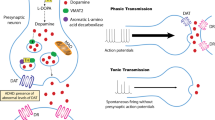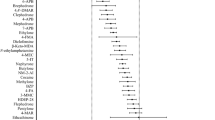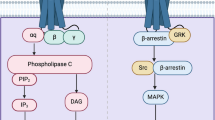Abstract
The effects of pretreatment with chloropromazine, promethazine or SKF 7265 on the severity of reserpine-induced rigidity were evaluated using a series of behavioral responses. Chlorpromazine (10 mg/kg) reduced the severity of the syndrome, particularly the tremor, but only at doses that also produced marked sedation. SKF 7265 was more effective than chlorpromazine and produced no detectable sedation or other motor impairment. Promethazine was ineffective in protecting against the effects of reserpine. These studies demonstrate that motor and behavioral abnormalities induced by high doses of reserpine can be blocked without inducing generalized sedation. This would suggest that it is possible to separate pharmacologically the motor pathways responsible for reserpine rigidity and those responsible for sedation.
Similar content being viewed by others
References
Anderson RJ, Brigham P, Southwick S (1979) The antispasticity efficacy and receptor selectivity of 10-(2-dimethylaminoethyl) acridan. Pharmacologist 21:149
Carlsson A (1978) Mechanism of action of neuroleptic drugs. In: Lipton MA, DiMascio A, Killam KF (eds) Psychopharmacology: A generation of progress. Raven Press, New York, pp 1057–1070
Glick SD, Goldfarb J (1976) Behavioral pharmacology. CV Mosby, St. Louis, pp 342–343
Johnels B, Steg G (1978) The role of the corpus striatum in reserpine-induced rigidity and akinesia in the rat. Acta Neurol Scand 57 (Suppl. 67):225
Jurna I, Lanzer G (1969) Inhibition of the effect of reserpine on motor control by drugs which influence reserpine rigidity. Naunyn-Schmiedeberg's Arch Pharmacol 262:309–324
Maxwell DR, Read MA, Sumpter EA (1974) Pharmacology of M and B 18,706, a drug which selectively reduces decerebrate rigidity. Br J Pharmac 50:35–45
Morrison AB, Webster RA (1973a) Drug-induced experimental Parkinsonism. Neuropharmacology 12:715–724
Morrison AB, Webster RA (1973b) Reserpine rigidity and adrenergic neurones. Neuropharmacology 12:725–733
Steg G (1964) Efferent muscle innervation and rigidity. Acta Physiol Scand 62 (Suppl 225):1–53
Author information
Authors and Affiliations
Rights and permissions
About this article
Cite this article
Southwick, S., Anderson, R.J. Antagonism of reserpine rigidity without inducing sedation. Psychopharmacology 74, 29–32 (1981). https://doi.org/10.1007/BF00431752
Received:
Accepted:
Issue Date:
DOI: https://doi.org/10.1007/BF00431752




